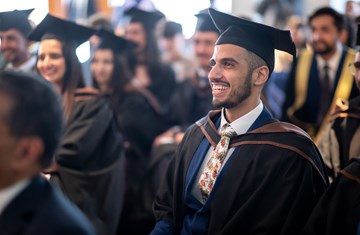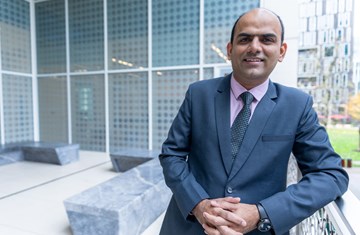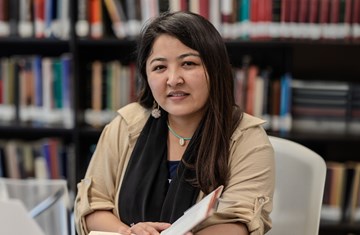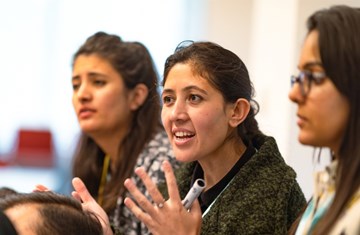Empowering minds, transforming futures: A journey of innovation and leadership in primary religious education
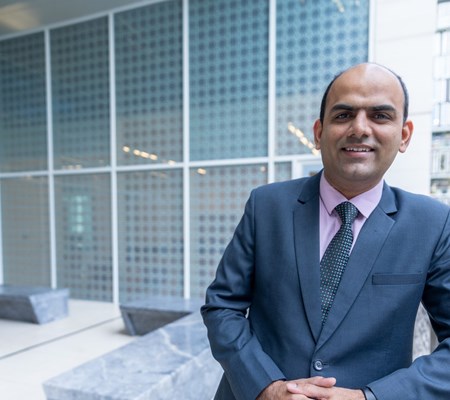
Alpesh Anwar Ali at AKC. Photo by Rehana Virani.
Explore Alpesh Anwar Ali's journey, a student from the IIS Primary Teachers Educators Development (PTED) programme, now in its second cohort since 2022, involves 14 Primary Academic Leads from 7 countries.
Scheduled to conclude in 2024, the programme encompasses three modules integrating face-to-face, individual, and collaborative learning, emphasizing field practice and the incorporation of Cambridge International syllabus with IIS content.
Innovation and Leadership in Primary RE
A pivotal milestone in my two-year tenure as the Primary Academic Lead has been my engagement in the Primary Teacher Educators Development Programme. The programme is a collaboration between The Institute of Ismaili Studies (IIS) and the University of Cambridge, and it has fundamentally shaped my approach to teaching. I have felt empowered by the competencies I have gained and feel confident that I can bring innovation and creativity to primary-level education, a responsibility I hold with immense pride.
The first two modules of the programme transcend the traditional confines of professional development, offering a holistic and enriching journey into the realm of primary religious education (RE). The high-quality curriculum is both rigorous and attuned to the real-world challenges encountered by primary RE educators. The programme’s strength lies in its fusion of theoretical knowledge with practical application, embodying the pedagogical principle of ‘praxis’ - the process by which theory is embodied and realised through practice. This approach provides a comprehensive understanding of the complexities of primary RE and equipped me with the tools to navigate and innovate within this field.
By integrating educational theories with classroom realities, the programme fostered a deeper understanding of learning processes, teaching strategies, and the dynamic nature of the classroom environment. It encouraged me to reflect on my teaching practices, question established norms, and strive for continual improvement in my quest to engage the malleable minds of young learners.
The programme emphasises innovation in teaching methods. Navigating through diverse pedagogical paradigms, with a particular nod to the Primary Ta`lim curriculum, it encourages creative thinking. Educational concepts like ‘active learning’, ‘reflective teaching practice’ and ‘inclusive learning’ resonated deeply with my own educational philosophy. These concepts, championed by renowned educators like Carol Ann Tomlinson, Lev Vygotsky, Geoff Petty and others, have inspired me to introduce innovative teaching techniques in my teaching practice, further enriching the learning experience for my students.
One notable example is the transformation of the classroom setting to promote inclusivity and active learning.
By changing the seating arrangement, I created a more inclusive environment, fostering collaboration and engagement among students.
This initiative not only enhanced the learning experience for my students but also inspired other teachers within the Baitul Ilm to adopt similar changes, leading to a positive ripple effect.
The programme's collaborative nature had a significant impact, creating a dynamic learning atmosphere that exposed me to varied perspectives and best practices from educators of diverse backgrounds. This approach encouraged the free exchange of ideas, leading to an exponential expansion of collective knowledge within the group. As a result, my understanding of primary RE has broadened, promoting the adoption of culturally sensitive and universally effective strategies.
Central to the programme's thematic tapestry was the importance of teacher empowerment, a theme that resonated resoundingly within my professional ethos. Recognising the critical role teachers play in shaping the future of the learners and armed with the arsenal of pedagogical tools and strategies to support volunteer teachers effectively, I have orchestrated a paradigm shift in supporting volunteer teachers. From mentoring imbued with insight to the judicious provisioning of resources and the creation of a positive and conducive learning environment, I have been able to implement these principles in my leadership role, contributing to the growth and development of the teaching community.
Beyond the academic domain, the programme has engendered a transformation in my leadership style and approach to organisational challenges. The emphasis on reflective practice encouraged me to consistently and thoughtfully evaluate and refine my methods, fostering a culture of ongoing improvement within the team, ultimately leading to more efficient practices.
Moreover, the programme has reignited in me a passion for research in education.
Exposure to cutting-edge research undertaken by the faculty members on the programme has inspired me to engage in ongoing research projects within the primary religious education landscape.
This rekindled enthusiasm for research has not only enriched my own understanding but has also contributed to the knowledge base of the volunteer teacher community.
In conclusion, my journey as the Primary Academic Lead, and my participation in the IIS Primary Teacher Educators Development Programme have been instrumental in my growth as an educator and a leader. The programme has provided me with a solid foundation of knowledge, skills, and insights that have enhanced my teaching practice and empowered me to contribute meaningfully to the development of primary religious education. Grateful for the opportunities, I eagerly anticipate the continued impact these experiences will have on my future endeavours in the field of education. I look forward to Module 3 in the summer of 2024.

